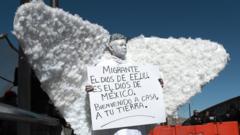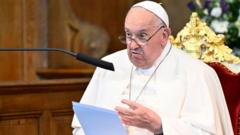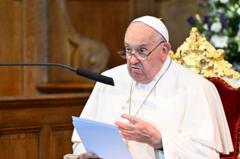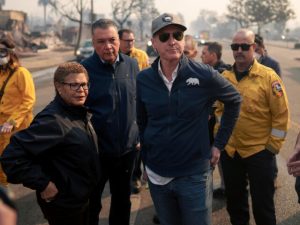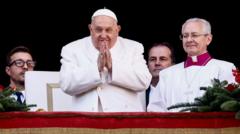Father Gustavo Gutiérrez, the Peruvian priest and key figure in liberation theology, has passed away in Lima at the age of 96, leaving behind a legacy that deeply influenced the Catholic Church's approach to social justice.
Father Gustavo Gutiérrez, Pioneer of Liberation Theology, Dies at 96
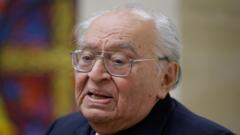
Father Gustavo Gutiérrez, Pioneer of Liberation Theology, Dies at 96
Iconic Peruvian priest's work on poverty shaped Church teachings, faced resistance from conservatives.
Gustavo Gutiérrez, a Dominican friar and influential theologian, died on Tuesday in Lima, Peru. He was widely known for founding liberation theology, a movement advocating for the Church's active role in addressing poverty and social injustice. Gutiérrez revolutionized Church doctrine with his groundbreaking 1971 publication "Theology of Liberation," which resonated strongly with many in Latin America while encountering resistance, particularly from conservative factions within the Church.
Born into a humble family, Gutiérrez studied medicine and literature in Peru before pursuing philosophy and theology in Europe. His exposure to Marxist ideas during this time led critics to label him a Marxist, a characterization that Gutiérrez rejected, asserting that his teachings stemmed from Biblical principles rather than revolutionary ideals.
His advocacy for the poor often put him at odds with Church authorities, including Cardinal Joseph Ratzinger, who later became Pope Benedict. Ratzinger argued that liberation theology posed a "fundamental threat" to the Church's faith, fearing its promotion of Marxist concepts would incite division. However, relationships grew warmer following Pope Francis's ascension, who recognized Gutiérrez's contributions during a heartfelt letter in 2018.
Throughout his career, Gutiérrez maintained that the Church often failed to address the real concerns of the poor, voicing critiques on the disconnect between clergy and laypeople. He believed that hope could thrive even in dire situations, emphasizing that poverty is a human-made condition, not a natural state.
Known for his humility and connection with the community, Gutiérrez balanced his theological pursuits with pastoral duties, actively participating in parish life. Those who knew him describe him as a joyful spirit dedicated to serving the needy. Félix Grández, a fellow Peruvian sociologist, noted his ability to communicate complex theological concepts in relatable terms, which resonated particularly with the youth.
Father Gutiérrez's loss marks the end of an era for many who saw him as a key figure in the struggle for social justice within the Church. His teachings will continue to inspire future generations, advocating for a Church that stands in solidarity with the poor.
Born into a humble family, Gutiérrez studied medicine and literature in Peru before pursuing philosophy and theology in Europe. His exposure to Marxist ideas during this time led critics to label him a Marxist, a characterization that Gutiérrez rejected, asserting that his teachings stemmed from Biblical principles rather than revolutionary ideals.
His advocacy for the poor often put him at odds with Church authorities, including Cardinal Joseph Ratzinger, who later became Pope Benedict. Ratzinger argued that liberation theology posed a "fundamental threat" to the Church's faith, fearing its promotion of Marxist concepts would incite division. However, relationships grew warmer following Pope Francis's ascension, who recognized Gutiérrez's contributions during a heartfelt letter in 2018.
Throughout his career, Gutiérrez maintained that the Church often failed to address the real concerns of the poor, voicing critiques on the disconnect between clergy and laypeople. He believed that hope could thrive even in dire situations, emphasizing that poverty is a human-made condition, not a natural state.
Known for his humility and connection with the community, Gutiérrez balanced his theological pursuits with pastoral duties, actively participating in parish life. Those who knew him describe him as a joyful spirit dedicated to serving the needy. Félix Grández, a fellow Peruvian sociologist, noted his ability to communicate complex theological concepts in relatable terms, which resonated particularly with the youth.
Father Gutiérrez's loss marks the end of an era for many who saw him as a key figure in the struggle for social justice within the Church. His teachings will continue to inspire future generations, advocating for a Church that stands in solidarity with the poor.





